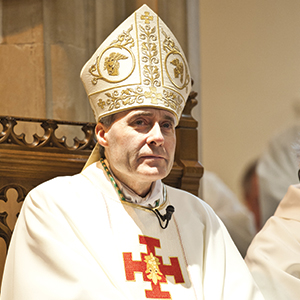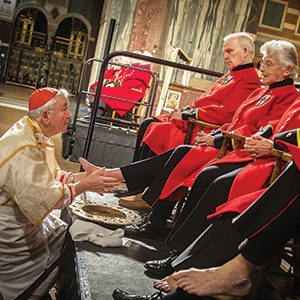Pope Francis’ decree for priests to wash women’s feet during the Holy Thursday liturgy has divided Catholics in the UK. Research by The Tablet has found that most responded with enthusiasm to the Pope’s change to the Holy Thursday liturgy. Eighty-three per cent of the 241 people who responded to our online poll said that women had been included in the foot-washing at their church.
Among the parishes named as washing women’s feet across England, Ireland and Scotland, were Sacred Heart Church, Exeter; St Mary’s, Falmouth; St Joseph’s, Guildford; St Charles, Gosforth; St Brigid’s, Belfast; Our Lady of the Annunciation, Bishop Eton, Liverpool; St Joseph the Artisan, Dublin; and St Fillan’s, Crieff.
At Westminster Cathedral Cardinal Vincent Nichols washed the feet of male and female Chelsea Pensioners (pictured).
Dr Gemma Simmonds CJ, theology lecturer at Heythrop College, London, who volunteers as a chaplain in Holloway Prison, participated in a Mass on Maundy Thursday where a group of female prisoners had their hands washed. “There is the sense of these women who have been publicly shamed because of being in prison being washed clean by the one who takes all our sins away … there’s a great sense of solidarity,” she said.
The London and Birmingham Oratories and St Mary Moorfields, in the City of London, were among churches that did not extend the invitation to women, despite the Pope’s instruction that priests may now choose from “among all the members of the people of God”. In 1955, Pope Pius XII set down rubrics that stated that only men could have their feet washed.
Dr Simmonds said it was “morally and spiritually urgent” for those who opt for exclusion to explain their decision. “How does anyone justify this, except by a kind of liturgical fundamentalism?” she told The Tablet. The Birmingham Oratory said they had already arranged for 12 men to participate in the service and could not comment on next year. The London Oratory was not available for comment.
Joseph Shaw, chairman of the Latin Mass Society, said that the change did not apply to those who follow the old rite. “Foot-washing as we have it now is a product of the 1956 reform of Holy Week. One of the things that changed was that it went into the Sanctuary, and that created a problem about women that didn’t exist before. People who follow the Traditional Mass have mixed feelings about those reforms. We’re not bound to this idea that foot-washing has to be understood in the somewhat narrow terms of the 1956 reformers. An understanding more connected with the poor, with the notion of service, is fine by me.”
Fr Paul Gunter OSB, department secretary of the liturgy office for the Bishops’ Conference of England and Wales, said that the Pope’s decree and its separate commentary provided a “clear guide” for those who planned liturgical celebrations. Citing a commentary on the decree by Archbishop Arthur Roche, secretary of the Congregation for Divine Worship, Fr Gunter said that it provided a “welcome liturgical catechesis” that would help pastors evaluate its desirability “according to the pastoral considerations”.
Ola Godbeer from Blessed Sacrament church in Exeter had her feet washed for the first time, although her parish had included women for many years. She said she found the experience “deeply moving” and as if Jesus was saying to her: “I am with you in this and in everything else in your life.”
31 March 2016, The Tablet
Washing of feet polarises parishes
 Loading ...
Loading ...
Get Instant Access
Subscribe to The Tablet for just £7.99
Subscribe today to take advantage of our introductory offers and enjoy 30 days' access for just £7.99



